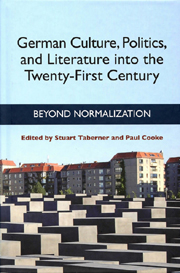Book contents
- Frontmatter
- Contents
- Acknowledgments
- Introduction
- 1 “Normalization”: Has Helmut Kohl's Vision Been Realized?
- 2 Coping with Disparity: Continuity and Discontinuity in Economic Policy since Unification
- 3 Understanding Germany: The Limits of “Normalization” and the Prevalence of Strategic Culture
- 4 “Normalization” through Europeanization: The Role of the Holocaust
- 5 “Representing Normality”: Architecture in Berlin
- 6 “Normalizing” the Past: East German Culture and Ostalgie
- 7 National Memory's Schlüsselkinder: Migration, Pedagogy, and German Remembrance Culture
- 8 The Return of “Undead” History: The West German Terrorist as Vampire and the Problem of “Normalizing” the Past in Margarethe von Trotta's Die bleierne Zeit (1981) and Christian Petzold's Die innere Sicherheit (2001)
- 9 “Normalizing” the “Old” Federal Republic? The FRG between 1949 and 1989 in Recent German Fiction
- 10 Reconciliation between the Generations: The Image of the Ordinary German Soldier in Dieter Wellershoff's Der Ernstfall and Ulla Hahn's Unscharfe Bilder
- 11 “(un)sägliche Vergleiche”: What Germans Remembered (and Forgot) in Former Yugoslavia in the 1990s
- 12 “Normal” as “Apolitical”: Uwe Timm's Rot and Thomas Brussig's Leben bis Männer
- 13 “Narrative Normalization” and Günter Grass's Im Krebsgang
- 14 From “Normalization” to Globalization. German Fiction into the New Millennium: Christian Kracht, Ingo Schulze, and Feridun Zaimoğlu
- 15 Abnormal Consensus? The New Internationalism of German Cinema
- Notes on the Contributors
- Index
7 - National Memory's Schlüsselkinder: Migration, Pedagogy, and German Remembrance Culture
Published online by Cambridge University Press: 05 February 2013
- Frontmatter
- Contents
- Acknowledgments
- Introduction
- 1 “Normalization”: Has Helmut Kohl's Vision Been Realized?
- 2 Coping with Disparity: Continuity and Discontinuity in Economic Policy since Unification
- 3 Understanding Germany: The Limits of “Normalization” and the Prevalence of Strategic Culture
- 4 “Normalization” through Europeanization: The Role of the Holocaust
- 5 “Representing Normality”: Architecture in Berlin
- 6 “Normalizing” the Past: East German Culture and Ostalgie
- 7 National Memory's Schlüsselkinder: Migration, Pedagogy, and German Remembrance Culture
- 8 The Return of “Undead” History: The West German Terrorist as Vampire and the Problem of “Normalizing” the Past in Margarethe von Trotta's Die bleierne Zeit (1981) and Christian Petzold's Die innere Sicherheit (2001)
- 9 “Normalizing” the “Old” Federal Republic? The FRG between 1949 and 1989 in Recent German Fiction
- 10 Reconciliation between the Generations: The Image of the Ordinary German Soldier in Dieter Wellershoff's Der Ernstfall and Ulla Hahn's Unscharfe Bilder
- 11 “(un)sägliche Vergleiche”: What Germans Remembered (and Forgot) in Former Yugoslavia in the 1990s
- 12 “Normal” as “Apolitical”: Uwe Timm's Rot and Thomas Brussig's Leben bis Männer
- 13 “Narrative Normalization” and Günter Grass's Im Krebsgang
- 14 From “Normalization” to Globalization. German Fiction into the New Millennium: Christian Kracht, Ingo Schulze, and Feridun Zaimoğlu
- 15 Abnormal Consensus? The New Internationalism of German Cinema
- Notes on the Contributors
- Index
Summary
In his lecture “Erziehung nach Auschwitz,” broadcast on Hessischer Rundfunk in 1966, Theodor Adorno postulated that political education should be centered on ensuring “daß Auschwitz sich nicht wiederhole.” In pedagogic debates, “Erziehung nach Auschwitz” is regarded as the foundation for post-1968 conceptions of education and socialization in Germany. Adorno, who had remigrated to Germany in 1949, had obviously not considered that the so-called guest workers, Gastarbeiter, arriving since the late 1950s, were coming to stay. If Adorno had anticipated this development, would his lecture have been written any differently? Or is it more likely that even then it would not have occurred to him, given his rejection of collective formations as oppressive, to think about “Erziehung” in ethnicized categories? In any case, although it is a recent development in Germany to speak about an “Einwanderungsland,” even more recent is the discourse about the possible relationship of postwar labor immigration to the memory of National Socialism and the Holocaust.
In this chapter, I argue that while migrantized women and men in Germany are excluded from a mainstream national remembrance culture, the debates challenging this exclusion are themselves marked not only by a further production of yet other “others” but also by a lack of interest in those migrant histories and positionalities that are prone to contradict a construed “neutrality” of migrants with regard to what is called the German past. Accordingly, these debates remain firmly within the parameters of mainstream discourse, merely adding another participant to the “dialogue” allegedly taking place between “Germans” and “Jews.”
- Type
- Chapter
- Information
- German Culture, Politics, and Literature into the Twenty-First CenturyBeyond Normalization, pp. 105 - 120Publisher: Boydell & BrewerPrint publication year: 2006

